Omega Force hamstrings its finest Warriors yet by going all-in on its soulless original character.
Back in 2006, I brought Dynasty Warriors Vol. 2 for the PSP to Show and Tell at school. Yes, I was that kid. It was a simple enough pitch. Behold, bemused classmates: a hack-and-slash power fantasy where you dominate 3rd-century Chinese battles, cleaving a hundred soldiers with each swing. There are loads of officers to play as, and some of them have massive swords, and some of them have glaives, and some of them are sorcerers, and they’re so cool, and, you can ride around on your horse, and you capture bases, and, there’s this one really cool guy, and he wears these big antlers, and he has the best horse in the game, and the whole time there’s electric guitars going weeeooow in the background.
“I’m not sure this is what actually happened,” said my history teacher.
“I don’t think the sorcery is real,” I replied, “but the antler guy is on Wikipedia.”
19 years on, Dynasty Warriors: Origins is a tougher pitch. While that horde-cleaving, guitar-shredding DNA still shines, Origins feels like a quarter-life crisis. For a good while, Dynasty Warriors coasted on its charm with a string of samey but endearing games. Now it’s 27, and after alienating its admirers with years of sleepwalking and a thundering dud in Dynasty Warriors 9, its confidence is understandably shaken. Origins, then, is as much a video game as it is a cry of “baby, I’ve changed!”. But there’s an essential distinction between change and growth. As anyone who’s grown fed up with a passive partner knows, we don’t want our loved ones to become someone else – we just want them to be better.
In combat, Origins is better. Dynasty Warriors was always more satisfying than precise or layered, a massacre of braindead peons broken up by fiddly bouts with slightly formidable officers. In Origins, though, even common foot soldiers fight viciously, coordinating attacks in formations. You can still slaughter them in droves like the old days, but they’re no longer entirely toothless.
Duels against officers meanwhile feel much closer to recent action RPGs than any other Dynasty Warriors game. Sekiro-style guard parries and countering unblockable attacks with special moves (a la Nioh 2) make for deliberate and reactive showdowns without slowing the action down. Origins deftly borrows a few strong mechanics from recent games and deepens its own formula, striking a unique balance between methodical combat and power-fantasy rampaging. Juggling a battalion of blokes with dash-canceled flurries is still on the menu, and I love it.


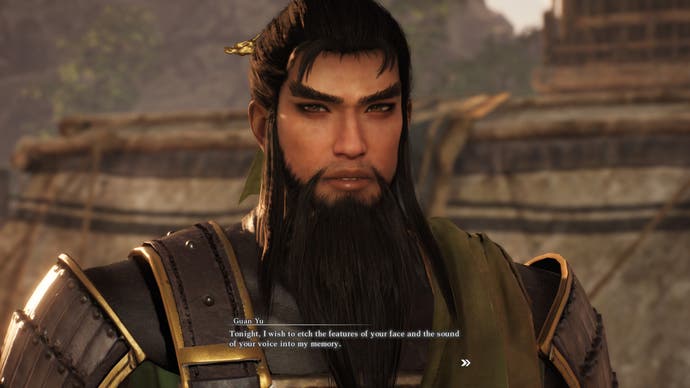
Battle itself is an all-time spectacular high for Dynasty Warriors. Lush foliage, sunbeams peaking through rows of trees, and dusty air in the battlefield bring a much-needed glow-up to a series that’s been visually stuck in the body of an early-gen PS3 game for decades. But more than just looks, Origins does a great job of making battles mechanically dynamic and involving. Rather than just being a super-soldier on the field, you can now issue commands to nearby groups of allied soldiers, from arrow volleys to infantry charges to battering rams.
Enemies issue commands too, making target prioritization a bigger priority than it’s ever been (because you’ll need to deal with those bloody archers). What I enjoy most, though, is that the battles have beats and sequences now, escalating from skirmishes for strongholds to climactic siege scenarios. There’s nothing quite like the hype of descending onto a castle with your fellow generals as the full might of both sides finally converge in an all-out brawl. The crescendo hits every single time, in no small part thanks to the presence of Even More Dudes on screen.
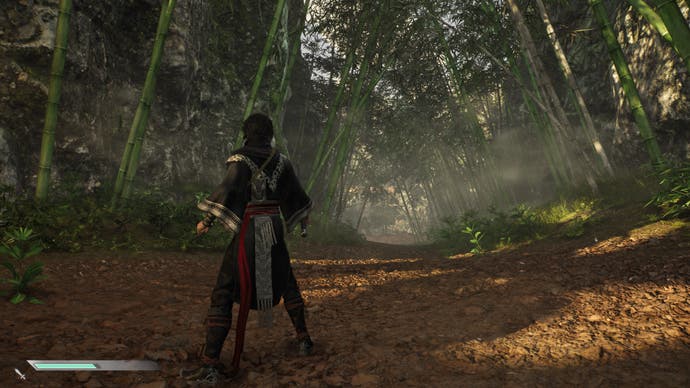
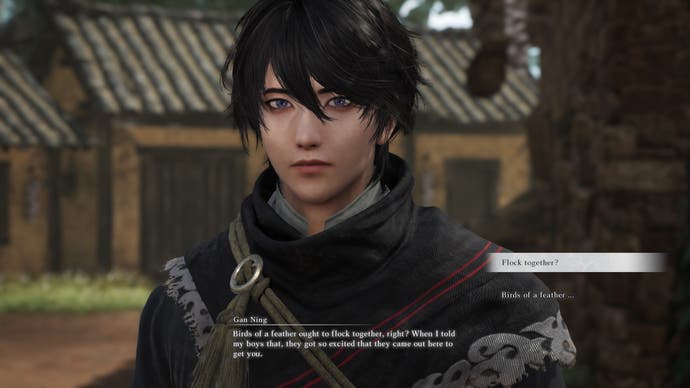
When Origins refines Dynasty Warriors, it shines. But when it chooses change over growth, it often forgets what it’s good at. That mislaid focus comes at a cost. Series mainstays like Musou Mode, Free Mode, and co-op have all gotten the chop. Instead, Origins goes all-in on a single story mode with missions spread across an overworld. For those getting flashbacks to Dynasty Warriors 9’s dreadful open world, I have good news and bad news. The good news is, it’s a dioramic overworld (a bit like Super Mario Wonder), so it doesn’t take forever to get around. The bad news is, it’s still a tedious and joyless space with nothing but crafting materials, lacklustre towns, and filler fights between missions. Above all, one change defines Origins: ditching the traditionally massive roster of playable officers for an original player character. The only opportunity to play as other officers is by assigning one as your bodyguard and briefly switching to them.
It’s a ballsy gambit but it doesn’t pay off. The playable character is a nondescript and emotionless vessel for a hackneyed amnesia story. What’s truly baffling about him is that he’s so aggressively ‘default’ that you’d assume he’s meant to be a blank slate, a canvas for the player to mold and project themselves onto. Yet there’s no way to personalise him at all other than naming him. Naturally, I named him Barry Dynasty. But even then, Origins goes on to name him Ziluan anyway – so Ziluan it is.
Ziluan bumbles through two plots – the war of three kingdoms vying for control of China, and the mystery of his origins. Early on, it’s revealed he hails from the Guardians of Peace, a tribe of assassins serving the vague goal of ‘order’. Never mind that Ziluan fights for aristocrats who yell ‘show no mercy’ while he slaughters surrendering conscripts. The nonsense and hypocrisy don’t compare to the painful exposition. Ziluan learns about himself through cryptic interventions where figures from his past pop up, lament his amnesia without helping, and info-dump when the plot calls for it. At one point, someone presents a glowing medallion to Ziluan and literally says “this light represents the hope of the people.” This is a story allergic to subtext.
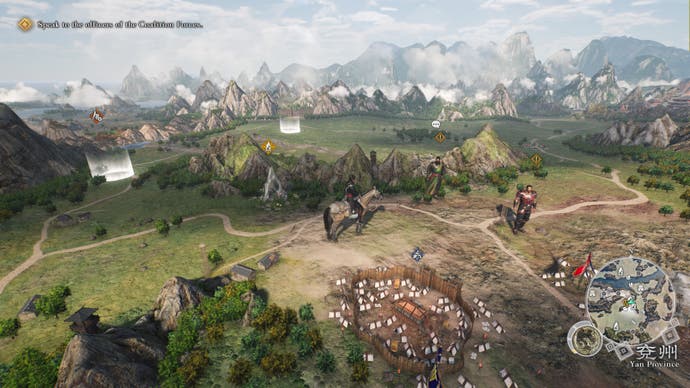
Building the game around Ziluan nonetheless presents some fresh game design opportunities. Rather than levelling up dozens of officers individually for shallow stat boosts like the old days, Ziluan gets all the focus here with several progression systems, like skill trees. Most of the unlocks consist of, well, shallow stat boosts. +5 bonuses to attack/defence/health and so on, with the occasional lacklustre special move here and there. However, Ziluan is also a martial virtuoso capable of wielding every officer’s weapon, and every kill levels up his proficiency for weapon-specific unlocks. Weapon mastery is the real meat of Ziluan’s progression: new combo routes, special abilities, movement options… all the changes that make these toys more playful and expressive emerge here. Unlocking a new stance to experiment with on your weapon of choice is a truly joyful moment that balloons your lethality to even more obscene heights.
The focus on Ziluan, however, blights the Three Kingdoms narrative. Alongside Ziluan comes a reputation system where you can level up your ‘bond’ with essentially every officer in the game, up to a maximum of Level 5. But here’s the deal. Ziluan is a human yawn with no desires, opinions, or initiative, yet nearly every character in the game instantly falls for him. It’s maddening how often characters pull Ziluan aside to profess their feelings, that they sense his purity of heart, that there’s ‘something about him’, only to awkwardly exit the scene two beats late with a glacial 180. There’s something truly unhinged about Guan Yu saying “tonight I wish to etch the features of your face and the sound of your voice into my memory” to the blank-faced black hole that is Ziluan. By the way, this was only a level 2 bond.
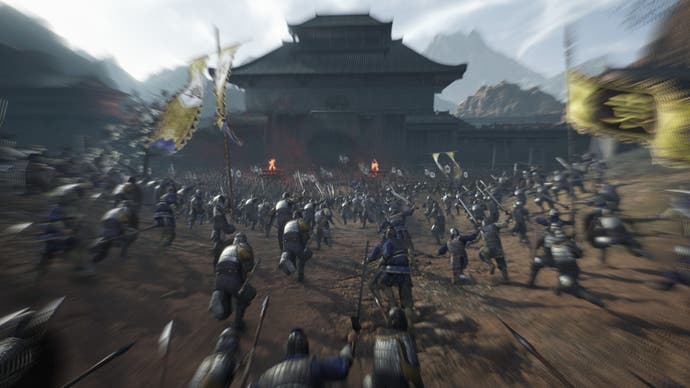
It’s a shame, because Ziluan eventually faces a compelling dilemma: the choice of which kingdom to serve once the real war kicks off. On paper, it’s a creative integration of the Musou mode from the old games, where you play through the war as your kingdom of choice. But by that point, the story’s dreadful execution has already starved the choice of its power. Origins just can’t help itself. It’s obsessed with doting over Ziluan, insisting on his boring and patronising origin story, and putting him on a pedestal in every scene. It’s a constant pace-killer, a tragic distraction from what otherwise could have been the most coherent and comprehensive Dynasty Warriors narrative to date. Would it still be cheesy and extra and waxing pseudo-philosophical? Damn straight. But at least it wouldn’t be getting in its own way.
The more I look at Ziluan, the more I see the nucleus of Origins’ problems. Without Ziluan, there’s no boring overworld full of pointless towns and dull loot – there’s quality battle after battle. Without Ziluan, there’s no woeful original plot diluting the pace – there’s the War of the Three Kingdoms. Without Ziluan, there’s no obligation to fawn over the player at all times – there’s a roster of sick officers to unlock and play as. Origins goes all-in on building itself around Ziluan, but whatever qualities his creators (or every officer in 3rd-century China) see in him, I certainly don’t. Barry Dynasty is no Dynasty Warrior at all. It’s almost poetic how Origins severs its roots for a character whose sole characteristic is identity loss.
Origins is a curious case. It’s a baffling mishmash of welcome growth and unwelcome change. Beneath this messy buffet of undercooked ideas lies the best version of the Dynasty Warriors I know and love. It’s a good game, but only when I recognize it. I’m glad you took some time away to find yourself, Dynasty Warriors, but I didn’t need you to grow a moustache and learn Seven Nation Army on bass. I just needed you to shower more and wash your dishes.
Dynasty Warriors: Origins review code was provided by the publisher.











Add comment